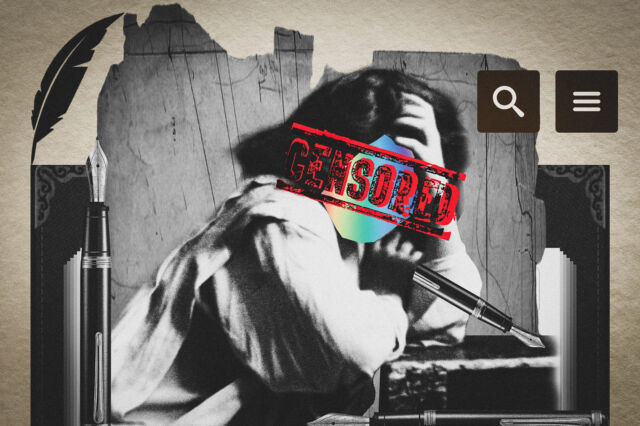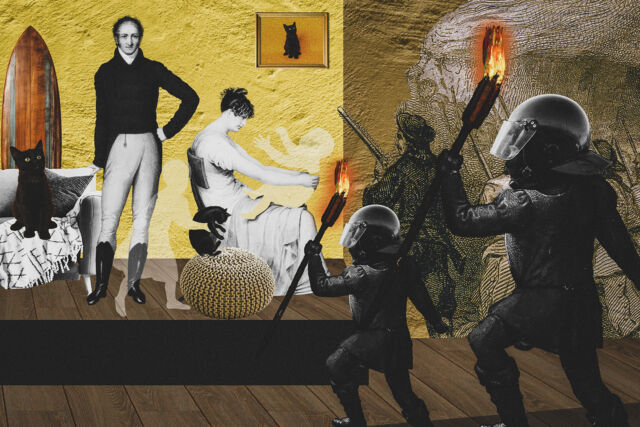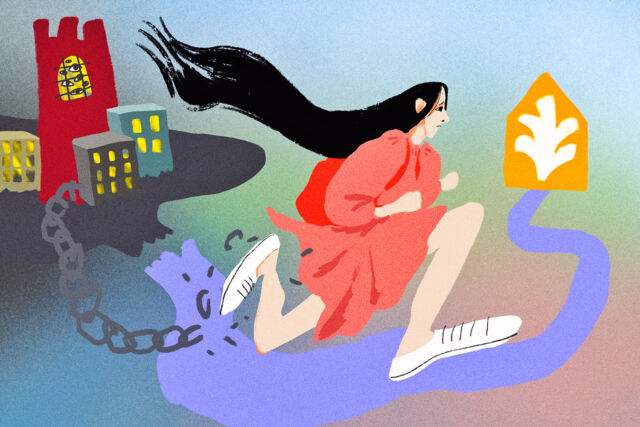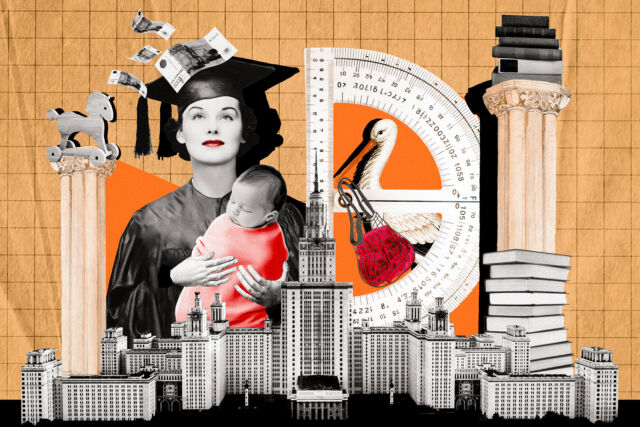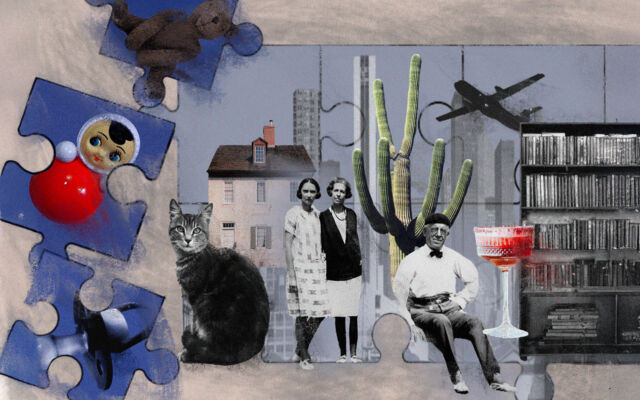Valeriya Volodina is the first Russian woman to have been awarded compensation by the European Court of Human Rights in a domestic violence case. Her former partner had been abusing her for years, and although she filed police reports multiple times, they failed to bring any results. In 2019, ECtHR held that the Russian government could not protect her or other women in a similar situation. This past September, the Court once again ruled in Volodina’s favour—this time, with regard to her complaint of cyberviolence committed by the same person.
Four years after changing her country of residence, 36-year-old Valeriya is still afraid of returning to her homeland. However, she has recently come back to social media to start sharing her story.
“And if something goes wrong, maybe it’s your own fault?”
I must have become immortal after all the things that happened to me, honestly. I grew up in a family where domestic violence was considered normal. But I always thought it wasn’t right and that it would never happen to me in my adult life. And that’s how it was until a certain point. All of my partners were good men, we didn’t fight, they never raised their voice at me. And they would definitely never hit me. I could not imagine I would find myself having to hide and run away to save my life.
In November 2014, my life changed forever. At the time I met that man, I was 29. I had a wonderful life: a partner, a job, a child. I was doing fine financially and could afford everything I needed. Everything changed after that encounter.
I was in a relationship with another man but I knew we were to break up soon. So I decided that some light-hearted flirtation wouldn’t hurt and would help me believe in myself. I was not expecting anything serious. But it so happened that that man and I started dating, and it was moving really fast. When he learned about my other relationship, it started bothering him a lot. He was very jealous. He told me to end it immediately and be exclusively with him, so I did. Right after that I lost my job—the currency crisis began. So I suddenly became psychologically and financially dependent on him.
When I still had feelings for him, I turned a blind eye on many problems. His jealousy was amusing to me at first, even though there was no reason for him to be that way. Sometimes we would be in a car and if I turned my head, he thought I was staring at other men. What happens next?
At first, all men who are not your relatives are expelled from your social circle. Then you stop talking to your female friends that allegedly are a bad influence.
But in reality, the abuser just makes you cut any ties with those who can knock some sense into you. So that nobody dares to turn you against him and say, “What are you doing? Can’t you see how weird it looks?” All the “unnecessary” people get expelled. It is only you and that person left.
Even when you start realizing something is wrong, your emotions tell you everything is fine. And if something goes wrong, maybe it’s your own fault? There is a lot of social pressure. In our country, no matter what happens to a woman, she is always the one to blame.
Three years of hell
In April 2015, Salayev beat Valeriya for the first time, and continued doing so every three to four months. She went to the police for the first time after getting beaten on January 1, 2016: they refused to open a case. After that, Valeriya moved from Ulyanovsk to Moscow. But Salayev kidnapped her and brought her back to Ulyanovsk. Two days later, he beat Valeriya, who was pregnant at the time. After that, she had a miscarriage. She went to the police again but neither that application nor later ones resulted in an investigation or prosecution. In 2019, the European Court of Human Rights ordered Russian authorities to pay Valeriya Volodina € 20,000 for non-pecuniary damage and almost € 6,000 more for legal costs. According to the justices, Russian authorities violated Articles 3 and 14 of the Convention (prohibition of torture and inhuman treatment and prohibition of discrimination) by not creating legal mechanisms for the protection of domestic violence victims, not taking any practical measures to protect Volodina for a long time, and not conducting an effective investigation into her allegations of inhuman treatment.
I can’t think of any especially shocking moments in my story. It was straight up three years of hell. I don’t even know what was the worst thing that happened to me: the miscarriage after getting beaten, getting kidnapped, or having my intimate photos shared with friends. He attacked me several times, tried to kill me, hit me… This nightmare lasted for three years. There were short breaks when I ran away, tried to start all over, and stand on my own two feet while being constantly followed. And for all those three years, I kept going to the police. I knew everyone starting from the precinct officer’s assistant to the heads of the Investigative Committee. So I was in contact with everyone but, as you can see, it did not help at all.
I don’t know how I managed to go through all that and stay sane. Although at certain points I had to seek professional help because it was really hard for me to handle on my own.

That man refused to accept the fact we were not together anymore and get over it. He had his own opinion on the situation, he told me, “You won’t be able to leave your house, you won’t be able to meet new people or get a job. You’re either with me or against me. I’m prepared to live in your staircase.” I thought he was bluffing but he was actually living in his car near the entrance of my building for five days. It was January. He took 20-minute breaks once in a while to go to the nearest McDonald’s to use the bathroom and eat. I called the police but they didn’t even send anyone to check what was going on. They told me he wasn’t violating any laws of the Russian Federation. Nobody could tell him not to sit in his car near my building. According to the police, if he wasn’t trying to enter my apartment, he wasn’t breaking the law.
I simply didn’t leave my home all those days. I was worried he could have a key copy. I put the key in the lock and turned it half way so that no one could open the door from the outside. But apparently, he realized it was better not to break into my apartment because then the police might come. So he just went on with psychological abuse. It may sound like he wasn’t causing any harm but
when you look out the window and see a psychopath sitting in the car 24 hours a day, and leaving your home can have fatal consequences to you, it is a big problem.
I don’t get why the police don’t take any action when such things happen.
Or, take my violation of privacy application, for example, when he was sharing my intimate pictures. The investigation was going on for three years. It was suspended, then closed, then reopened. Finally, they didn’t find who did this, turned the accused into a witness, and that was it.
We all know how our agencies work when they need something. You can leave a comment criticizing the authorities on social media and they will find you anywhere. But in my case, when everything was obvious… This case was investigated after the previous repeated episodes of violence, bullying, and stalking. You didn’t have to be a genius investigator to know where it was coming from. Nonetheless, the case didn’t lead to anything.
Salayev created fake social media profiles impersonating Valeriya. He sent friend requests to the people she knew, classmates, and relatives, and then posted her intimate photos. In April 2019, Valeriya sent her second application to the ECtHR complaining that the authorities had failed to protect her from cyberviolence. On September 14, 2021, the Court decided in Valeriya’s favour again. It held that the Russian Federation violated Article 8 (right to respect for private life) and awarded Volodina with € 7,500 compensation for non-pecuniary damage.
I managed to survive and take control of my life back. Now I am ready to put myself out there. I started working on my book. It all has been really hard. When we won the ECtHR case, I didn’t believe it at first and then went crazy with joy: I thought we reached a logical conclusion and things would get better. But then I realized nothing would really change. I was hoping my case would be a starting point for adopting the law on domestic violence in our country. But it’s been two years and I see no progress.
After the ECtHR decision, they started investigating my “discontinued” cases again. They conducted additional checks but the only case they brought to action in 2021 was the one on death threats. He sent death threats to me and my family via texts and messengers. They only initiated it to report to the Committee of Ministers, to Europe, that measures had been taken. In fact, when it comes to death threats cases, the statute of limitations is two years. This episode happened in 2016. Moreover, they chose the least harmful thing he did. For some reason, they investigated battery followed by miscarriage, kidnapping, or causing grievous bodily harm. I don’t think I need to explain why they are doing that.
I still don’t feel safe because that man is still free. They say I am destroying traditional family values. Many have said negative things about me. In their opinion, I should have just gotten used to it and thrown myself to the wolves instead of submitting complaints to the European Court. That makes me an unwanted citizen in my own country.

Of course, domestic violence is common in Russia. But what was flagrant in my case is that the authorities didn’t react to my applications. The ECtHR decision set a precedent. I exhausted all domestic remedies. At least seven of my reports have not led anywhere. That is, all my reports were refused. And that man has not received any punishment, neither criminal nor administrative. He is still living and working in Russia and having a good life. We won in the European Court so I thought the situation would change. But it all has stayed pretty much the same.
We can only hope for some kind of divine retribution, karma, the boomerang effect… It doesn’t look like the Russian authorities want to punish him. I don’t know what it is all about, what makes him so “unique”. Although, in Russia, if you have money, connections, and diaspora support, you can solve any problem, I guess.
“Leaving the country was my only option”
I moved to France when I realized there was no hope for justice in Russia. So, that man could still do anything to me. I knew I had no choice—changing cities was pointless. I ran away from Ulyanovsk to Moscow and he managed to find me in a city with a population of twenty million people. Leaving the country was my only option.
I chose the path of least resistance: I signed up for a dating website and in the first week, I met my future husband. I was just lucky. I’m not saying marrying a foreigner is a solution for all problems. In fact, I’m trying to promote the idea that a woman shouldn’t build her life around a man. Because it is not the meaning of her life.
You can live without men, especially if you don’t get positive emotions from them.
It’s just at that moment, I felt trapped. It was my only chance to move abroad because I didn’t know anyone there. I didn’t feel strong enough mentally or physically and I didn’t have enough money to move to a new place without having a place to go.
So I met this man. We were talking on that website for a few months. Then we exchanged phone numbers and texted on WhatsApp for a few months more. Finally, we decided to see each other in person. He invited me and paid for the airfare and a hotel. I took the risk and went to see him. It went well, we started dating, and he told me he would like to marry me. It seemed like a fairy tale: after all I had been through, it felt like a dream.
So, I flew home just to pack my things and we’ve been together since. I can’t speak for others but from what I’ve seen, the way women are treated in Europe is completely different. Women are not objectified. They don’t think you automatically have less value or owe something to others just because you’re a woman. But I’m only speaking from my personal experience, it could be different for others. It isn’t absolutely perfect but here you feel safe, you are a complete person and not someone’s extension.
After moving to France, the first thing I tried to do was to establish a routine, calm down, and breathe easier. Here, nobody is going to stalk and follow me. I don’t have to carry pepper spray or a stun gun with me. I can relax and enjoy my life. Nobody will catch or sell me or hand me over. When I let go of these worries, I felt relieved. But at the same time I felt empty. I had a lot of free time. We live in a picturesque area surrounded by mountains and the sea. I have a little Bichon dog. We often take walks and have a great time in nature. I needed to find a way to spend my time so I started learning the language. My husband and I talk in English, which is not the native language for either of us. So I would teach him Russian and he would teach me French.
Finally, I felt ready to write a book. A psychologist once told me that in order to move on, you should either start a diary or start working on a book. That is, put your feelings down on paper. A book may help me and other people who I will share my personal experience with.
I am convinced a lot of women get abused in one way or another. They might not get beaten but they most probably have faced harassment, stalking, bullying, or financial abuse.
After that man started creating fake profiles, I stopped using social media. I didn’t have any active profiles, only blank ones I made to read the news and listen to music. I didn’t post anything and wasn’t ready to go public. But now I am. Before the second judgment, I created Facebook and Instagram accounts. It so happened I have lawyers, journalists, and people dealing with the topic of abuse on my Facebook. And my Instagram is more personal. A lot of women wrote to me about their problems seeking advice and support. I even started a regular post called Breaking the old-fashioned values: women send me their stories and I publish them anonymously. I want them to break the silence and stop feeling afraid and ashamed. I want them to know they are not alone. On my Instagram page, nobody is going to tell them it was their fault.
I am already finishing the book. Next, I am going to post some parts from it and collect feedback. Dozhd TV channel has even shot an entire movie dedicated to my situation and stalking in general. Also, this September, Russian Vogue published a big article about my story.
“I lived like a special agent”
It seems to me that when a woman is looking for a partner, it’s like she’s playing Russian roulette. Any man can turn out to be an aggressive person, a psychopath, or an abuser. Sometimes, men act aggressively just because they know they can. Many of them realize they won’t get any punishment.
In our country, everyone thinks hitting a woman once in a while serves an educational purpose and is not even considered to be abuse.
Russian men don’t think of psychological, sexual, or financial abuse as real things. They don’t realize there is such a thing as marital rape. When it comes to financial abuse, they would say, “Well, yeah, I give my wife almost no money but it’s because I don’t want her to buy unnecessary stuff. It’s my money after all!” All these things are not considered to be problematic.
I used to be carefree and frivolous, even. It has changed, I stay wary of people, and it’s hard for me to trust someone. After all that happened, I haven’t managed to find new friends. But I trust and respect those who were supporting me along the way even more now. My bond with family and friends got stronger.
Today, four years after I fled, I am finally putting myself out there and starting to let new people in. In my book, I’d like to share my real story. Mass media wrote about it but they either didn’t tell the full story or distorted some of the information. Some were saying that person was my husband but that’s not true. We weren’t officially married, we didn’t have kids together. He was just a stranger who was terrorizing my whole family and me for three years.

I’m not planning to start any media activity in Russia. It’s not for me, I wouldn’t want to do it. My goal is to help women find their inner strength and realize they’re not just some extension to a man. I want them to stop thinking the only achievement they can have in life is marrying a man and devoting their life to him.
I always feel anxious when I come back to Russia. I am terrified of entering an airport there. The last time I saw Salayev was during a face-to-face confrontation at the Investigative Committee premises in 2018. He acted happy, lively, cynical, and totally confident. I haven’t seen him ever since then. The investigators were telling me, “He already got married, he doesn’t even think about you, what else do you want?” As if I should just let it go and be happy for his marriage and not insist on investigations and punishment.
I believe the appropriate punishment for that man would be a life sentence or being placed in a psychiatric hospital, I don’t know. Everything he’s done is obviously not how a mentally stable person behaves. I don’t wish any harm to his family and parents. But I am sure he is not going to receive any punishment in Russia. The European Court rules against the Russian government, not against Salayev, so in this respect he’s safe too.
The situation with domestic violence in Russia has hardly changed. If anything, it got worse: during the pandemic, family relationships went wrong all over the world, and cases of domestic abuse have increased. However, people in Russia are changing their opinion on feminism, especially younger girls. They are not as closed-minded as the older generation or even our own. They know it is not normal when one sex is considered better than the other.
Every day, newspapers publish stories of people who were subjected to abuse as children, teenagers, or adults. People talk about women and children in their families having been physically abused. Victims finally started speaking out about their painful experiences. And we should talk about it as much as we can so that our voices actually get heard. After everything they’ve been through, these people are also under pressure when they decide to go public. Law enforcement doesn’t help them, society makes them feel guilty, they don’t get any support. You can only receive support from people with similar experiences. So I suggest girls and women join social media groups for those who went through the same horrible things. This is where you can actually get sensible advice and support. You can’t count on posting something on your personal profile and getting help there. The chances you will get support this way are incredibly low.
They were writing a lot of bad things about me too: most often, they blamed everything on me since I was not leaving him. In fact, I left multiple times and not just my home—I changed cities, jobs, my last name, and SIM cards.
I lived like a special agent. I would go to an underpass and buy 20 to 30 anonymous SIM cards at once so I could change them every two to three days. I wasn’t able to talk to my relatives because I was afraid that was his way of finding me. But it turned out he planted a tracking device inside my purse and installed one in my car. When I came to the police, they laughed in my face saying, “Look how much he loves you! You won’t find anyone who’s going to love you like that! Look what kinds of crazy things this man does for you, and you don’t appreciate that!”
It turned out you can track people using the billing system. This billing database is not really expensive, you can buy it on the dark web. Even if you don’t know what to do with this database, there are people you can pay who will find anyone anywhere. They can get any kind of data, your bank card information, Directorate for Traffic Safety data, etc. In order to go off radar, you would need to get rid of your phone and other gadgets and move to the taiga. Only then, they won’t find you.
“I am not going to stay silent anymore”
As for the haters, there were comments calling me a “snow bunny”. You know what I’m talking about? “What did she expect? She got in with an Azeri, she got what she deserved.” They were saying a lot of stuff like this. I didn’t even realize how racist people were in our country. In the police, they told me, “You get involved with non-Russians and then walk around complaining.” I replied, “So, Russian men don’t drink, don’t hit and rape women?” The policeman, of course, couldn’t think of anything to say back.

All in all, there is a lot of hate. If you’re a woman, you’re always the one to blame. If someone commited a crime against you, proving you really are a victim will be like banging your head against a brick wall. And still, society will find reasons to bully you.
Now that I started getting back to it again, that man is capable of doing anything. And yes, I am ready for it. So I always say: you should know that this man is free, he has an unlimited money supply and connections. If something happens to me, it will not be an accident or suicide.
But I am not going to stay silent anymore. There is nothing wrong with women—society just constantly tries to make us believe that. It’s the same way they tell us women’s friendship doesn’t exist and you should always see another woman as your enemy. However, the truth is,
no one can understand and support a woman like another woman. But because they pit women against each other, we are still vulnerable.
To be honest, I love Russia. But living there is dangerous. Being a woman in Russia is like playing the boss level in a game. I wish I could go back to my homeland without thinking it will be my last time. I’d like women to feel safe. I wish men stopped killing, hurting, and raping women. And I wish they finally adopted the law against domestic violence.
Tatiana Savvina, a lawyer with the Stichting Justice Initiative project, comments on the ECtHR’s judgment on Valeria Volodina’s complaint of cyberviolence:
Stichting Justice Initiative handled the case from the very start when Valeriya sought our assistance in 2016–2017. The second European Court judgment concerns cyberbullying. It was a continuation of the first judgment on physical and psychological violence: Valeriya’s former partner beat her, kidnapped her, and cut the brakes of her car.
We believe the judgment will not just make a difference in this particular case but positively influence the quality of life for all Russian women. Russia has obligations, one of them is to comply with the ECtHR judgments not only in terms of individual measures but also in terms of so-called general measures to change legislation and practice. The first judgment concerns multiple acts of physical and psychological domestic violence. We do not have a law on domestic violence in Russia. The European Court indicated that the existing rules are insufficient in protecting women. It was also pointed out that Russia remains one of the two countries in the Council of Europe that does not have restraining orders or any similar mechanism for taking urgent protective measures. This is a violation.
Russia must comply with both judgments in the Volodina case by paying her non-pecuniary damage compensation and conducting effective investigations into her allegations. For example, in the second judgment, the Court indicated that the Russian authorities did not protect the woman from repeated acts of violence on the Internet: her former partner created fake profiles over and over again, kept sharing her photos, and sent her threats. The authorities’ reaction was clearly inadequate and insufficient (they simply did not do anything). The Court also stated a common problem: there are no effective legal remedies in Russia against repeated acts of violence. Therefore, Russia’s obligations here concern not only the specific applicant but the country’s legislation in general. That is why I believe that both of these judgments will affect Russian practices in the broadest sense—in the sense of protecting women from both physical and virtual violence.
Now the state has three months to appeal the judgment before the Grand Chamber. But I think in this case the Russian Federation is not going to appeal it. In three months, when the judgment becomes final, the issue of its enforcement will be considered by the Committee of Ministers. This is not a quick process and I can’t tell how long it will take. The judgment on the first case was delivered two years ago yet there is still no law on domestic violence in Russia, although that first judgment requested its adoption. But we also see that some measures are actually being taken by the state. For example, the Supreme Court recently proposed to move battery cases from the private prosecution category to the public-private one. This step will help improve the situation a little. Russia is trying to do something, albeit very slowly.
In the second judgment, the Court says: there are tools for fighting cyberviolence in Russian legislation, there is a relevant article of the Russian Criminal Code. But in practice, in Valeria’s case, a criminal case on the threats claim was never initiated. And the criminal case on the claim of intimate photos having been published was initiated two years after the complaint. Also, the investigation into that case went on for two years—it was so slow and ineffective that the statute of limitations had expired, which led to total impunity.
All this shows that our state is unable to protect women from cyberviolence. If investigators had clear instructions on how to work on these cases, if investigators and police officers were trained and knew what cyberviolence was—that it is not a private matter but a serious crime—they would conduct their investigations differently. We could do our job even based on the existing laws but in practice, this does not happen.

The Different series is a project by Glasnaya and Novaya Gazeta about people who do not meet the standards of today’s Russian society, which leads to them becoming invisible to the majority. In Russia, it is customary not to notice, to ignore “others”, those who are different—and ignorance becomes the breeding ground for xenophobia and discrimination.
Those who are different are often afraid to put themselves out there. But there are more and more people who have already overcome their fears. Those are women and men breaking stereotypes and the framework of patriarchy.
The material is published jointly with Novaya Gazeta.


